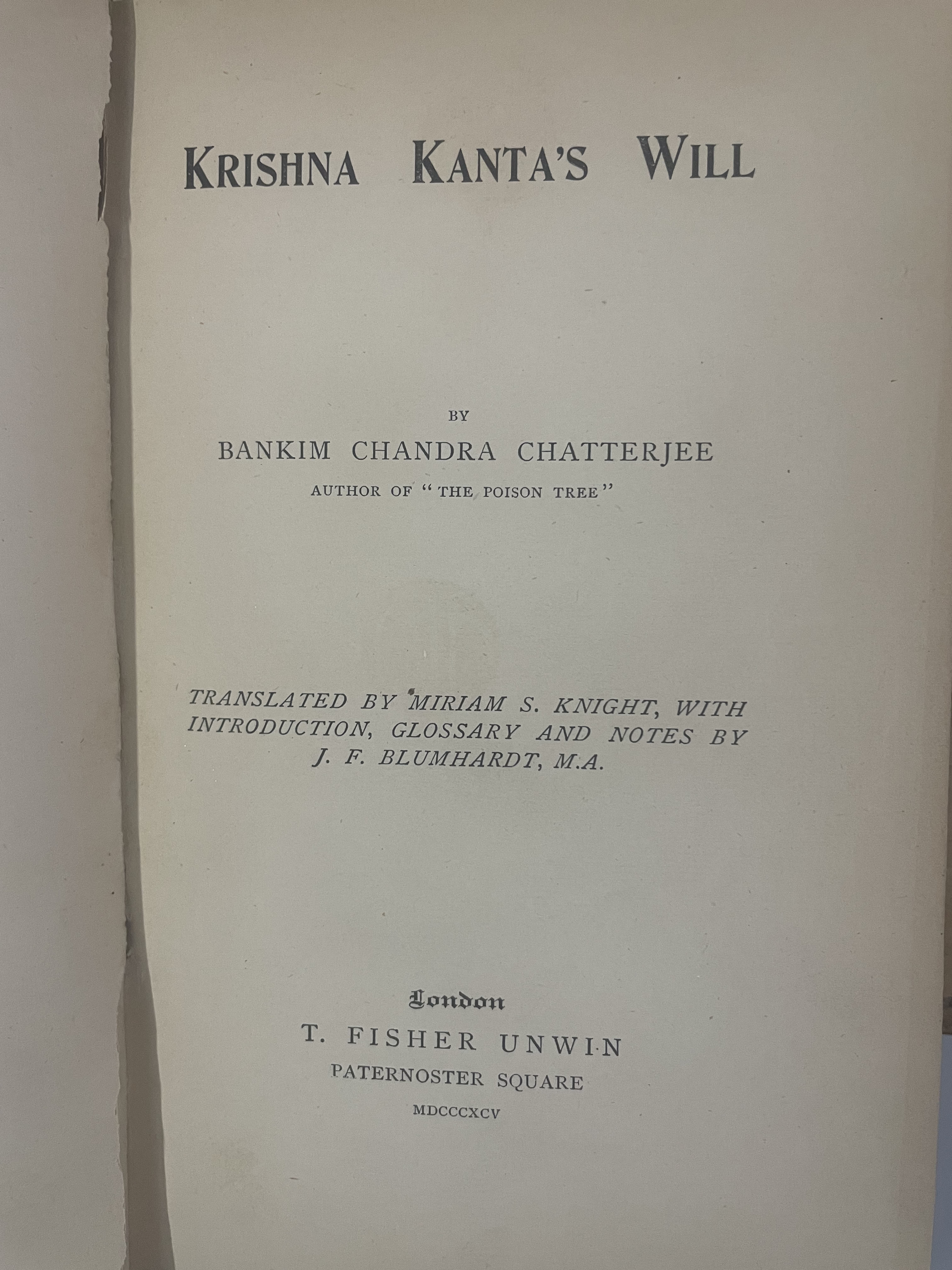Krishna Kantas Will

About
Summary
Exquisite
TOC
Details
Related
URL
Images
Overview
Krishna Kanta's Will by Bankim Chandra Chatterjee, published in 1878, stands as a landmark in Bengali literature, delving into complex themes of love, betrayal, morality, and social issues prevalent in 19th-century Bengal. Set against the backdrop of a traditional zamindari family, the novel explores the intricacies of widowhood, inheritance, land ownership, and patriarchal norms within Hindu society.Krishna Kanta's Will revolves around the family of Krishna Kanta Roy, a wealthy and influential zamindar (landlord) in Haridragram. The story unfolds through a series of dramatic events triggered by Krishna Kanta's decision to bequeath half of his property to Gobindalal, his deceased brother's son, while dividing the remaining share among his own children and his brother's widow. This seemingly fair decision sets in motion a chain of conspiracies, betrayals, and tragic consequences that expose the darker aspects of human nature and the rigid social structures of the time.
Importance of Book
Pioneering Novel: It is recognized as a pioneering work of Bengali literature, marking a departure from traditional literary forms and exploring contemporary social issues.
Realistic Portrayal of Society: The novel offers a realistic portrayal of 19th-century Bengali society, capturing the nuances of its social customs, religious beliefs, and economic realities.
Complex Characters: Chatterjee's characters are complex and multi-dimensional, grappling with moral dilemmas and exhibiting both strengths and weaknesses.
Social Commentary: Krishna Kanta's Will provides insightful commentary on social issues such as widowhood, patriarchy, and inheritance, prompting readers to question and challenge prevailing norms.
Key Themes
Patriarchy and Inheritance: The novel explores the power dynamics within a patriarchal society, where inheritance and land ownership determine social status and control. Krishna Kanta, as the head of the family, wields immense authority, and his decisions regarding the will have far-reaching consequences. The conflict between Haralal and Gobindalal over the inheritance highlights the tensions and rivalries that can arise within families due to patriarchal norms.
Widowhood: Krishna Kanta's Will poignantly depicts the plight of widows in 19th-century Bengal12. Rohini's character embodies the vulnerability and marginalization faced by widows, who were often denied basic rights and subjected to social ostracism. The novel challenges the prevailing societal norms that restricted widows' freedom and agency.
Love and Betrayal: The story explores the complexities of love, desire, and betrayal, showcasing the destructive consequences of infidelity and moral compromise. Gobindalal's infatuation with Rohini leads to the betrayal of his wife, Bhramar, and ultimately contributes to the tragic downfall of several characters.
Morality and Redemption: Krishna Kanta's Will delves into questions of morality, guilt, and redemption, examining the characters' struggles with their conscience and their attempts to atone for their sins. Gobindalal's remorse after betraying Bhramar and Rohini's willingness to accept punishment for her actions demonstrate the characters' internal conflicts and their search for moral absolution.
Social Justice: The novel touches upon themes of social justice and equality, questioning the rigid social hierarchies and discriminatory practices that prevailed in 19th-century Bengal. Chatterjee critiques the power structures that marginalized women, particularly widows, and perpetuated inequality based on caste and gender.
Family Bonds: Krishna Kanta's Will explores the value of a loving and supportive family in a person's life.
Cultural Significance
Reflection of Social Change: The novel reflects the social and intellectual ferment of 19th-century Bengal, a period of rapid modernization, social reform, and growing nationalist sentiment.
Influence on Later Writers: Chatterjee's work has inspired generations of Bengali writers, shaping the development of the Bengali novel and influencing the treatment of social themes in literature.
Exploration of Universal Themes: Krishna Kanta's Will explores universal romantic themes of love, betrayal, and morality, making it accessible and relevant to readers across cultures and time periods.
Effects on Society
Raising Awareness: The novel raised awareness about the plight of widows and the need for social reform, contributing to the growing movement for widow remarriage and women's rights.
Challenging Social Norms: Chatterjee's work challenged traditional social norms and encouraged readers to question the rigid hierarchies and discriminatory practices that perpetuated inequality.
Inspiring Social Action: Krishna Kanta's Will may have inspired individuals and organizations to take action to address social injustices and promote equality, contributing to the broader movement for social reform in Bengal.
Conclusion
Krishna Kanta's Will is a seminal work of Bengali literature that offers a compelling narrative, complex characters, and insightful social commentary. Its exploration of themes such as patriarchy, widowhood, love, and morality continues to resonate with readers today, making it a timeless classic.
Title
Krishna Kantas Will
Author
Bankim Chandra Chatterjee
Name of Publisher
Mint Editions
Publish Date
1878
Subject
The novel addresses themes of social reform, moral dilemmas, and the conflicts between traditional values and modernity in 19th-century India
Vintage
1801-1900
Category
Literary
Sub Category
Drama
Rarity
RARE
